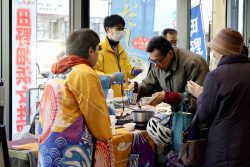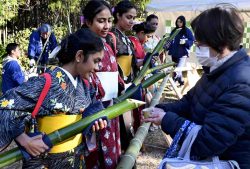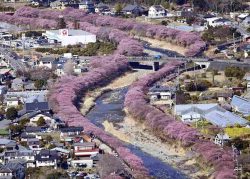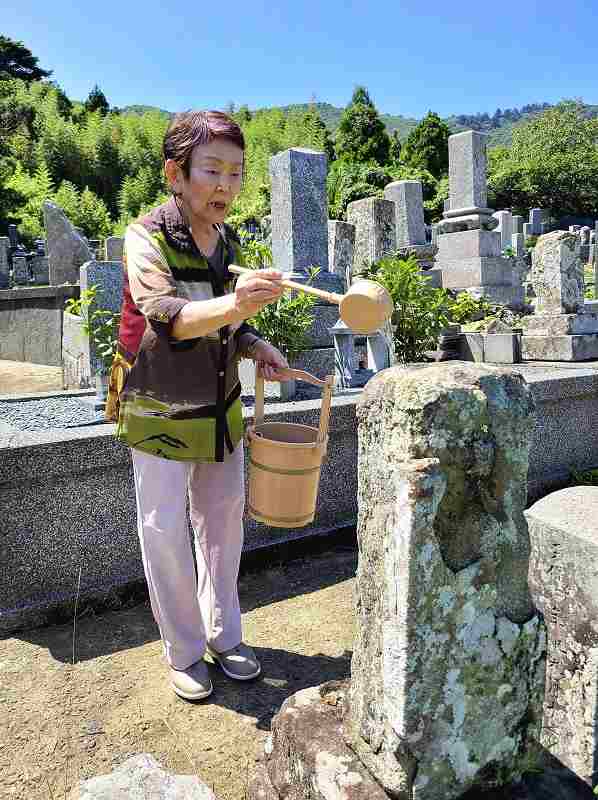
Makiko Sakura prays at the tomb of a Russian soldier, which she used to visit with her grandfather, on Nishinoshima island, Shimane Prefecture.
11:08 JST, October 4, 2021
NISHINOSHIMA, Shimane — Even today, many people on the Oki Islands in the Sea of Japan off Shimane Prefecture continue to maintain the many tombs of Russian soldiers who lost their lives there during the Russo-Japanese War (1904-05).
Among the islanders is Makiko Sakura, who lives on Nishinoshima island, one of the Oki Islands. However, the 85 year old had once been reluctant to mourn the Russians because her father was detained in Siberia by the Soviet Union after World War II. She could not tolerate Russia, where her father was forced to do harsh labor in freezing conditions.
Having overcome such feelings, however, she is trying to pass on the islanders’ humanity to the next generation.
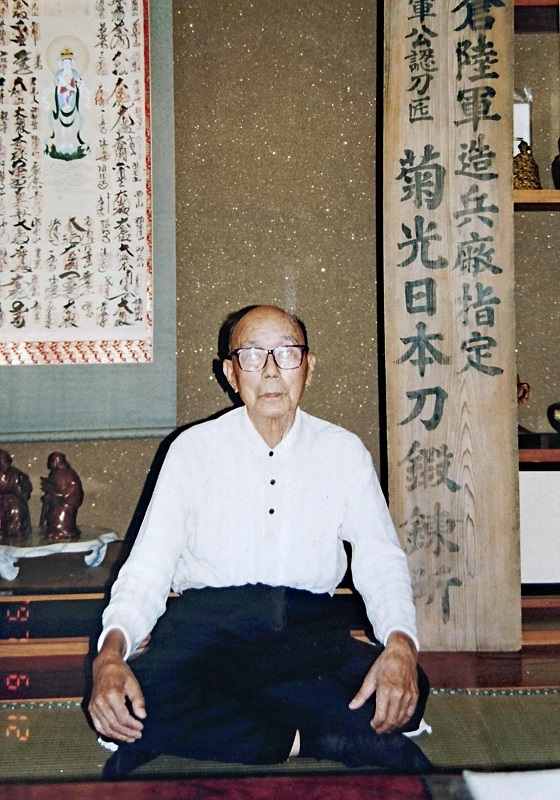
A photo taken in 1997 shows Kikujiro Sakamoto, the father of Makiko Sakura.
Makiko’s father, Kikujiro Sakamoto, was known as a skilled bladesmith before he died in 1999 at 93. He went off to war in 1944 at 38, which was an advanced age at the time for being a soldier. He was in Manchuria, now part of China, when the war ended.
Makiko learned about the war’s end on the radio at her neighbor’s house. She remembers she was happy while grown-ups around her were depressed and crying.
“I thought that as the war was over, my father would come home,” she said.
But he did not immediately return.
Daily life was tough for her family. There were rumors going around that the Occupation Forces would raid her house because swords had been made there, and about four of Kikujiro’s precious swords were indeed stored there. The people of her house were scared of the raid and sank the swords in the sea.
Later, Makiko learned from someone who knew Kikujiro’s whereabouts that he apparently was forging the rails for the Trans-Siberian Railway. She knew it was cold in Siberia, but she had no choice but to convince herself he could stay in a warm place when working.
At that time, Makiko started to place her hands together in front of a tomb of Russian soldiers. Her grandfather was concerned about his son’s family where a mother and her children lived alone. Makiko sometimes went to help him in the rice fields, and each time she was taken to a nearby tomb of the Russian soldiers.
“Russian soldiers’ bodies were washed away to this area during the Russo-Japanese War. Put your hands together and give them water,” her grandfather told her. She was repulsed by the idea.
“The Russians have robbed me of my papa and are forcing him to do hard labor,” she said to her grandfather. He admonished Makiko, patting her head.
“Don’t talk like that. They have died here, and they couldn’t go home,” her grandfather said.
Her younger siblings mourned for the dead, as they were told to do. After refusing two or three times, Makiko finally stood in front of the tomb with her hands together, but she never mourned for the dead. Instead, she said she silently prayed, “Please let my father come home.”
‘There were good people, too’
Kikujiro returned to Japan in 1948, three years after the war ended. After he returned to his hometown, he did not talk much about what it was like during the detention as he struggled to provide for his family.
Makiko remembers that her father had been a very strict man. But after returning, he became kind to the children. She was impressed by the fact that he sometimes said, “In Russia, there were good people, too.”
Kikujiro later told her about an episode in Russia. According to the story, Russian residents came to him one day, hearing that he was a skilled bladesmith. They secretly asked him to repair pots and knives and gave him a loaf of brown bread in return. He shared it with eight of his friends. They were always hungry.
Speaking about the memory, he seemed to remember the taste of the loaf. “How delicious that brown bread was!” he said.
Kikujiro encouraged his daughter to go to college and get a job. Apparently he had been impressed by the Soviet society he saw during his life in Siberia. In the country, women and men did the same work and were paid the same wages, which was not common in Japan at the time.
Kikujiro said to Makiko, “From now on, women must have jobs, too.”
Makiko went to a high school on Oki Island and then to a college in Tokyo to become a nutritionist.
After graduation, she worked as a Shimane prefectural employee at a public health center and other workplaces.
The feelings she had for Russia gradually changed.
After she retired, she talked with an old islander. He had also been detained in Siberia, but after his return, he continued to take care of the tombs of the Russian soldiers.
Farmers and fishermen on the island have all contributed money to mourn for the dead soldiers from a foreign country who were once their enemies. When she learned about the history, she was amazed at the islanders’ thorough love for humanity.
“I want to pass on the thoughts of our ancestors from this island to the youth,” she said.
Tombs of Russian soldiers
The bodies of Russian soldiers washed ashore along the Sea of Japan coast and islands during the Russo-Japanese War. The soldiers had participated in the Battle of Tsushima in 1905 and other battles, and tombs built by the Japanese residents still remain in some parts of the areas.
Hidenori Okazaki conducted a survey on the number of such graves. According to the 70-year-old former high school teacher in Matsue, there remain 17 tombs in Shimane Prefecture, including Matsue, Izumo and the Oki Islands. He said that 10 of the 17 tombs are on the Oki Islands.
Okazaki referred to folklore of the islands for why there are so many left on the Oki Islands. The islanders have long been told that if you give a generous burial to drifting corpses, you will have good luck.
He cited another reason.
“Fishermen might have seen themselves in such soldiers who had drifted ashore because they also might die during the dangerous work at sea,” he said.
Tombs for Russians along Sea of Japan
The bodies of Russian soldiers washed ashore along the Sea of Japan coast and islands during the Russo-Japanese War. The soldiers had participated in the Battle of Tsushima in 1905 and other battles, and tombs built by the Japanese residents still remain in some parts of the areas.
Hideki Okazaki conducted a survey on the number of such graves. According to the 70-year-old former high school teacher in Matsue, there remain 17 tombs in Shimane Prefecture, including Matsue, Izumo and the Oki Islands. He said that 10 of the 17 tombs are on the Oki Islands.
Okazaki referred to folklore of the islands for why there are so many left on the Oki Islands. The islanders have long been told that if you give a generous burial to drifting corpses, you will have good luck.
He cited another reason. “Fishermen might have seen themselves in such soldiers who had drifted ashore because they also might die during the dangerous work at sea,” he said.
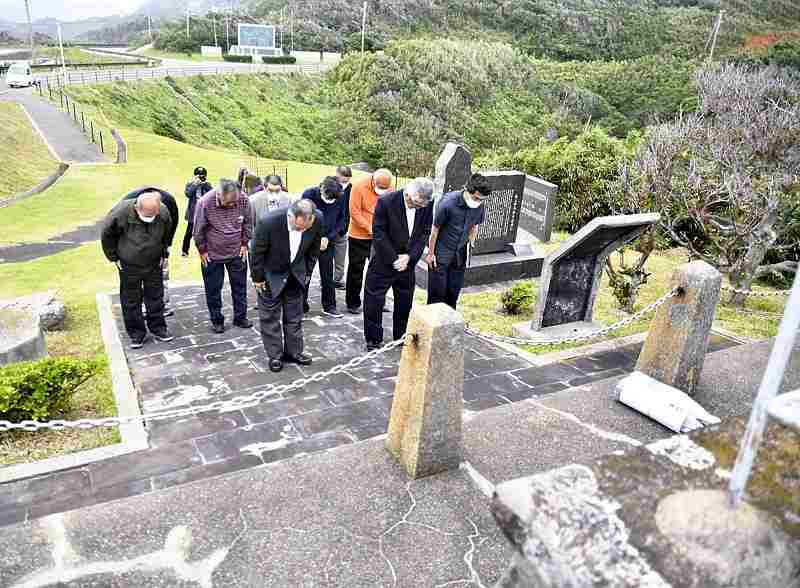
Residents offer a moment of silence at a monument in the Nishidomari district of Tsushima, Nagasaki Prefecture, on May 28.
Makiko Sakura prays at the tomb of a Russian soldier, which she used to visit with her grandfather, on Nishinoshima island, Shimane Prefecture.
Memorial service held annually in Tsushima
TSUSHIMA, Nagasaki — A memorial service for Japanese and Russian soldiers who died during the Russo-Japanese War is held every May on Tsushima island, Nagasaki Prefecture.
The Battle of Tsushima, the final stage in the war, was fought on May 27 to 28 in 1905 in the waters off the east coast of Tsushima. There, the Combined Fleet of the Imperial Japanese Navy shattered the Imperial Russian Baltic Fleet, which had been considered the strongest fleet in the world.
It is said having escaped from their ship, about 160 Russians arrived by boats in the Nishidomari area, the northern part of the island, where the local islanders treated them well, such as by providing them with food and lodging.
A memorial service was held in Nishidomari on May 28 this year to commemorate the 5,000 people who died in the battle that took place 116 years ago. Fifteen residents of the area participated in the ceremony.
They laid flowers at two monuments — one commemorating the Battle of Tsushima and the other for mourning the war dead of both countries — and offered silent prayers.
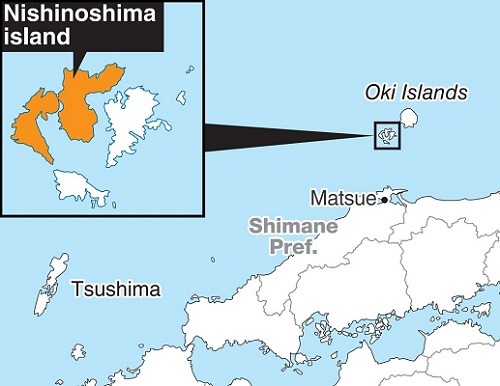
A map of ‘Nishinoshima island’ in the Oki Islands, Shimane Prefecture, Japan.
Related Tags
Top Articles in Features
-

Sapporo Snow Festival Opens with 210 Snow and Ice Sculptures at 3 Venues in Hokkaido, Features Huge Dogu
-

Tokyo’s New Record-Breaking Fountain Named ‘Tokyo Aqua Symphony’
-

Tourists Flock to Ice Dome Lodge at Resort in Hokkaido, Japan; Facility Invites Visitors to Sleep on Beds Made of Ice
-

High-Hydration Bread on the Rise, Seeing Increase in Specialty Shops, Recipe Searches
-

Heirs to Kyoto Talent: Craftsman Works to Keep Tradition of ‘Kinran’ Brocade Alive Through Initiatives, New Creations
JN ACCESS RANKING
-

Japan PM Takaichi’s Cabinet Resigns en Masse
-

Japan Institute to Use Domestic Commercial Optical Lattice Clock to Set Japan Standard Time
-

Israeli Ambassador to Japan Speaks about Japan’s Role in the Reconstruction of Gaza
-

Man Infected with Measles Reportedly Dined at Restaurant in Tokyo Station
-

Man Infected with Measles May Have Come in Contact with Many People in Tokyo, Went to Store, Restaurant Around When Symptoms Emerged


